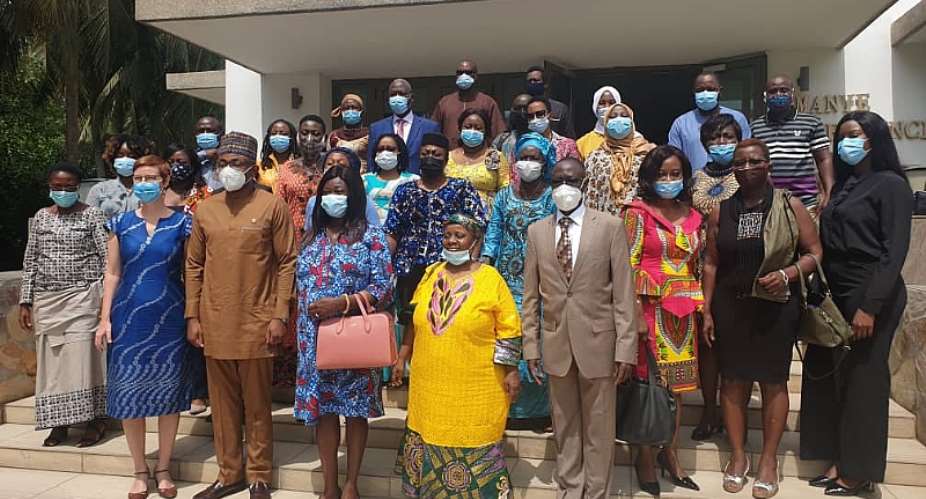As part of Maximising opportunities for the African Continental Free Trade Area (AfCFTA), UNDP in collaboration with ECOWAS organised a workshop, capacity building programme to enhance the capacity of women to maximise opportunities in AfCFTA.
The workshop aims at promoting a single continental market for goods and services, with free movement of business persons and investments.
The three days workshop will also highlight the requirements for exports to various African countries, discuss e-commerce as a tool for exploring new markets, and provide an overview of financing instruments that can be utilised by women-led SME's as they scale across borders.
In her opening remarks, Mrs Kosi Yankey Ayeh, CEO, Ghana Enterprise Agency said, despite the enormous benefit the AfCFTA is expected to deliver, Africa's trade potential is undermined by constant barriers encountered by women in informal trading.
"Studies have shown that Africa's informal sector accounts for 85% of the continent's total economic activity with women accounting for 90% of the informal sector's labour force", she said.
She underscored that the government of Ghana has undertaken series of public sensitization and workshops across the country to update the private sector on the implementation of the AfCFTA protocols and the operational requirements for effective trading in the market.
"For us in Ghana, we have braced fully with the partnership between government and the private sector to ensure that maximum benefits are derived from the AfCFTA. And we believe that the benefits to be derived under the AfCFTA will not happen until it is properly and effectively implemented", she said.
Emphasizing that, the AfCFTA is a major tool to transform African economics if women and gender issues are made central and incorporated in National AfCFTA Strategy Documents for implementation.
Frederick Mugisha, Economic Advisor, UNDP, explained that the UNDP work programme on the AfCFTA is focused on making the AfCFTA work for women and for youth, two groups that have the potential to drive the transformation of Africa's economies.
"The AfFCTA pursues the progressive liberalisation of services, prioritising five sectors in the first round of negotiations to be concluded this year -- business services, ICT services, financial services, transport and tourism. These sectors all have the potential to attract investment, create jobs and support the free flow of trade in goods or other services".
"Women are Africa's traders. If you look at any market and any border of this continent, the majority of traders will be women. However women remain at the lower rung of value chains -- in the agriculture sector, when trading in goods, women often sell primary and perishable agricultural sector, when trading in good, women often found on the lower rungs of the ladder in the hospitality industry", said the UNDP Deputy Resident Representative in Ghana, Silke Hollander.
Frederick Mugisha explained that Ghana has moved a step ahead in Africa trading.
Adding that National Development Planning Commission is trying to provide guidelines for all sectors to include Africa trade into their planning processes.
On his part, Mr Kolawole Sofola, Ag. Director of trade, ECOWAS Commission said the establishment of the African Continental Free Trade Area is one of the best instruments that has been crafted for the African continent since political independence.
According to him, SME's predominated the cross-border trade in Africa countries; up to about 40% of economic operators which mostly are managed by women or youth.
Adding that, they must be enabled to operate unhindered within the legal instruments in the Agreement.
He further urged all stakeholders should embrace the Agreement.
"We must use it to upscale our production, leverage our innovations, protect our knowledge and add value to the diversity of raw materials produced in the continent whether agricultural, forestry, fisheries, minerals, livestock. Our resources have been exploited and exported for the benefit of others. This makes us lose significant value as we forfeit the downstream processes and the value that comes with them", he stated.






 Akufo-Addo’s govt is the ‘biggest political scam’ in Ghana’s history – Mahama ja...
Akufo-Addo’s govt is the ‘biggest political scam’ in Ghana’s history – Mahama ja...
 Performance Tracker is not evidence-based — Mahama
Performance Tracker is not evidence-based — Mahama
 Four arrested for allegedly stealing EC laptops caged
Four arrested for allegedly stealing EC laptops caged
 $360 million IMF bailout not enough for Ghana – UGBS Professor
$360 million IMF bailout not enough for Ghana – UGBS Professor
 Shrinking Penis Allegations: Victim referred to trauma hospital due to severity ...
Shrinking Penis Allegations: Victim referred to trauma hospital due to severity ...
 Adu Boahen Murder: Case adjourned to May 9
Adu Boahen Murder: Case adjourned to May 9
 ‘I've health issues so I want to leave quietly and endure my pain’ — Joe Wise ex...
‘I've health issues so I want to leave quietly and endure my pain’ — Joe Wise ex...
 Let’s help seek second independence for Ghana before NPP sells the country – Law...
Let’s help seek second independence for Ghana before NPP sells the country – Law...
 New Force aims to redeem Ghana and West Africa — Nana Kwame Bediako
New Force aims to redeem Ghana and West Africa — Nana Kwame Bediako
 ‘I didn't say I would buy Ghana if voted against; I said I’ll buy it back from f...
‘I didn't say I would buy Ghana if voted against; I said I’ll buy it back from f...
